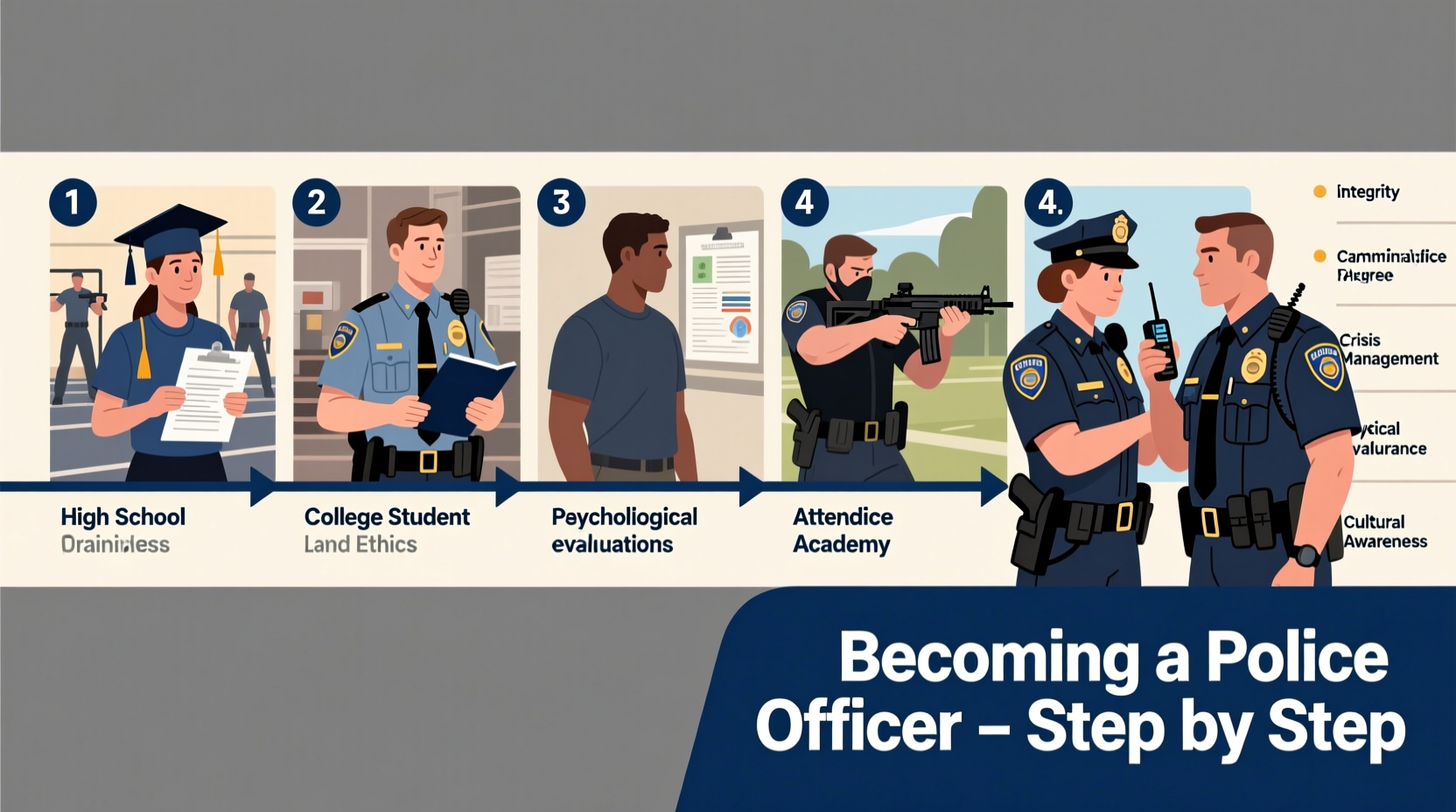Becoming a police officer is more than just a job—it's a commitment to public service, safety, and justice. The path requires discipline, integrity, and resilience. While the process varies slightly between jurisdictions, the core steps remain consistent across most regions in the United States and similar countries. This comprehensive guide walks you through each phase of becoming a police officer, from initial eligibility to academy training and long-term career growth.
Step 1: Meet Basic Eligibility Requirements

Before beginning the application process, ensure you meet the minimum criteria set by law enforcement agencies. These are non-negotiable and serve as the foundation for all future steps.
- Be at least 21 years old (some departments accept candidates at 18–20).
- Hold a high school diploma or GED; many agencies prefer or require some college coursework or an associate’s degree.
- Be a U.S. citizen or legal resident (requirements vary by state).
- Have a valid driver’s license with a clean record.
- Pass a thorough background check with no felony convictions.
Step 2: Build Essential Skills and Experience
While meeting basic requirements opens the door, possessing key competencies significantly improves your chances of acceptance and success in the field.
Core Skills Every Aspiring Officer Should Develop
| Skill | Why It Matters | How to Develop It |
|---|---|---|
| Physical Fitness | Officers must chase suspects, perform rescues, and endure long shifts. | Train regularly with cardio, strength, and agility exercises. |
| Critical Thinking | Rapid decision-making under pressure is crucial. | Take logic courses, practice situational judgment tests. |
| Communication | De-escalation, report writing, and community interaction depend on clarity. | Volunteer in public-facing roles or join debate clubs. |
| Ethical Judgment | Integrity is foundational in law enforcement. | Study ethics, reflect on moral dilemmas, and seek mentorship. |
“Character is tested not when things go right, but when they go wrong. We look for candidates who demonstrate consistency in honesty and responsibility.” — Captain Lisa Mendez, LAPD Recruitment Division
Step 3: Complete Education and Pre-Application Preparation
Although a college degree isn’t always mandatory, it provides a competitive edge. Many departments offer hiring preferences or higher starting salaries for candidates with degrees in criminal justice, psychology, or public administration.
Consider enrolling in a two-year associate program or four-year bachelor’s degree. Coursework in constitutional law, criminology, and emergency response builds relevant knowledge.
Recommended Pre-Cadet Actions
- Enroll in a certified CPR and first aid course.
- Shadow a local officer if department policies allow ride-alongs.
- Attend community policing events to understand department culture.
- Prepare mentally and physically for the Physical Ability Test (PAT).
Step 4: Navigate the Application and Selection Process
This stage is rigorous and multi-layered. Success depends on preparation, consistency, and attention to detail.
Key Stages in the Hiring Pipeline
- Written Exam: Tests reading comprehension, reasoning, and report writing. Study guides are often available through the department.
- Physical Agility Test: Includes sprints, wall climbs, dummy drags, and obstacle navigation. Train specifically for these tasks.
- Background Investigation: A polygraph test may be included. Investigators will review employment history, social media, credit history, and personal references.
- Psychological Evaluation: Assesses emotional stability, stress tolerance, and suitability for duty.
- Oral Interview Board: Panel-style interview evaluating communication, ethics, and situational judgment.
- Medical Examination: Ensures physical readiness for active duty.
Do’s and Don’ts During the Selection Process
| Do | Don't |
|---|---|
| Arrive early and professionally dressed | Show up late or casually dressed |
| Be honest during background checks | Omit or falsify information |
| Practice common interview questions | Memorize answers robotically |
| Maintain composure under pressure | Lose temper during role-play scenarios |
Step 5: Attend and Graduate from the Police Academy
Once conditionally hired, recruits enter a full-time training program lasting 12 to 30 weeks, depending on the agency. The academy combines classroom instruction with hands-on tactical training.
Typical Academy Curriculum Includes:
- Criminal law and constitutional rights
- Firearms training and range qualification
- Defensive tactics and hand-to-hand combat
- Emergency vehicle operation (EVOC)
- First responder medical procedures
- Community policing strategies
- Report writing and evidence collection
Training is intense and structured. Recruits are evaluated daily on performance, discipline, and teamwork. Failure to meet standards can result in dismissal.
“The academy doesn’t make you a cop—it prepares you to become one. Real learning begins on patrol.” — Sgt. Marcus Tran, NYPD Field Training Officer
Field Training Program (FTO)
After graduation, new officers enter a probationary period (typically 3–6 months) working under experienced field training officers. They respond to real calls, write reports, and apply learned protocols under supervision.
Success in FTO leads to full certification and solo patrol duties.
Mini Case Study: From Security Guard to Sworn Officer
Jamal Reyes worked as a campus security guard while completing his associate degree in criminal justice. Though not a sworn officer, he gained experience handling disturbances, documenting incidents, and interacting with local police.
He used this experience to strengthen his application, secured strong letters of recommendation, and trained six months in advance for the physical exam. After three attempts at the written test, he passed and advanced through the selection process.
Today, Jamal serves as a patrol officer in Austin, Texas, crediting his early exposure and persistence for his success.
Long-Term Career Growth and Specialization
Becoming a police officer is just the beginning. With time and performance, numerous advancement opportunities emerge:
- Detective or Investigator: Focus on solving crimes, requiring additional exams and experience.
- K-9 Unit, SWAT, or Traffic Enforcement: Specialized units often require competitive applications and extra training.
- Supervisory Roles: Sergeant, lieutenant, and captain positions involve leadership and management training.
- Community Outreach or Training Divisions: Ideal for those passionate about education and public engagement.
Continuing education, such as earning a bachelor’s or master’s degree, enhances promotion potential. Many departments offer tuition reimbursement programs.
Frequently Asked Questions
How long does it take to become a police officer?
The entire process typically takes 6 to 18 months, depending on the department’s hiring cycle, academy availability, and individual preparation time.
Can I become a police officer with a past misdemeanor?
It depends on the nature and timing of the offense. Minor infractions may be overlooked, especially with demonstrated rehabilitation. Serious offenses like domestic violence or drug distribution are usually disqualifying.
Is prior military experience helpful?
Yes. Military veterans often receive preference in hiring due to their discipline, physical fitness, and experience with firearms and protocol. Many departments have veteran recruitment initiatives.
Conclusion: Take the First Step Toward Service
Becoming a police officer demands dedication, courage, and a genuine desire to protect and serve. The journey is challenging, but for those committed to making a difference, it offers lifelong purpose and opportunity. Start by assessing your eligibility, strengthening your skills, and preparing thoroughly for each stage of the process. Whether you're still in school or considering a career change, the path begins with a single step—apply with confidence, train with discipline, and serve with integrity.









 浙公网安备
33010002000092号
浙公网安备
33010002000092号 浙B2-20120091-4
浙B2-20120091-4
Comments
No comments yet. Why don't you start the discussion?